There is no denying that internet has become a default part of our life. Simultaneously, both b2b and b2c marketing strategies are evolving to get the advantages out of the various marketing channels.
Be it social media, email or search engines – marketers can engage the target group across various touch points and nurture them. Since converting b2b clients require consistent effort, choosing a combination of different marketing channels can help you stay relevant to the target group. The brand familiarity which results from consistent messaging allows you a 10x increase to your conversion potential.
Hence, in this blog, we will discuss B2B online marketing, from its basics to how you can implement various strategies to reach customers.
What is B2B Online Marketing?
Business-to-business or B2B marketing is marketing your products or services to other organisations or businesses through various digital marketing channels. The main objective of business-to-business marketing is to familiarise your brand name and show the value of your product or services to other businesses.
It can help you attract both new and established business owners and engage key stakeholders by highlighting your value propositions.
What are the Benefits of B2B Online Marketing?
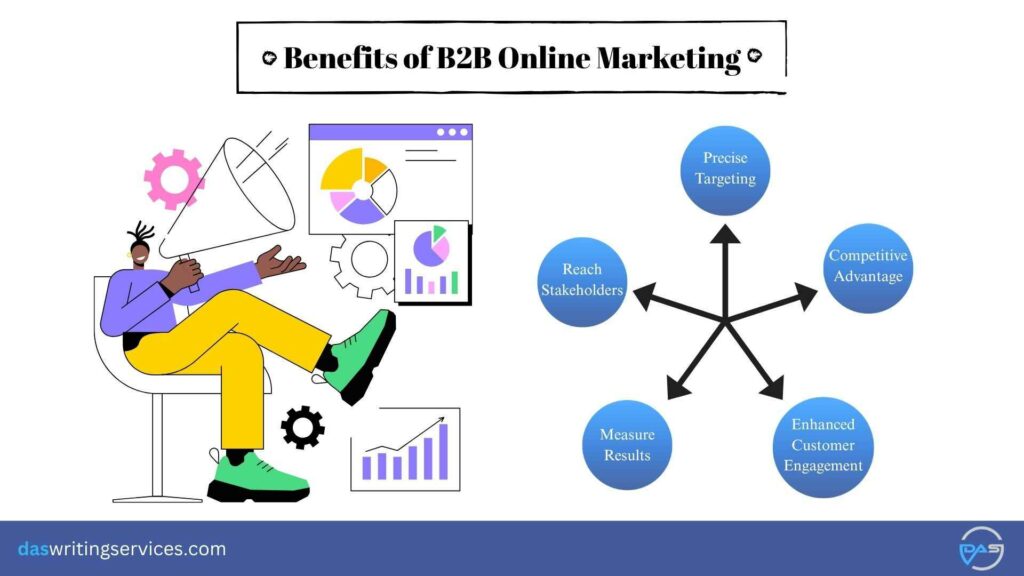
According to a report, 56% of business-to-business organisations invest in online marketing strategies. It helps to stay ahead of their competition and reach a wider target audience. Here are some benefits of online marketing for your B2B organisation:
1. Precise Targeting
With the help of B2B online marketing, you can precisely target the potential customers who can convert on the basis of demographics and online activity. It can also help you identify and target the customers visiting your website. In addition, it differs from traditional marketing strategy, which costs more and has limited reach.
2. Reach Stakeholders
Using B2B online marketing strategies, you get involved in a longer buyer journey and engage with potential customers throughout the process. It helps you to get in touch with the buyers at the initial stage of their journey when seeking online information. In addition, you can utilise various B2B online marketing channels, like advertising and email marketing, to proceed in the funnel and keep them engaged.
3. Measure Results
Measuring your campaigns’ success and results is easy with B2B online digital marketing tactics. As several online digital marketing tools are available, you can use them to identify which strategies drove the best results for your B2B business. In addition, you can use such information to adjust your B2B online marketing strategies, enhancing your marketing performance and ROI.
4. Enhanced Customer Engagement
As a B2B organisation, you must engage with your audience via preferred online platforms. By investing in online marketing, community building, and social listening, B2B marketers can strengthen relationships, build trust, and create valuable opportunities for interaction. It positions their companies as customer-centric leaders in their specific industry.
5. Competitive Advantage
In today’s competitive business landscape, B2B firms must stay ahead of their competitors to thrive. Thanks to online marketing as it offers businesses a competitive edge by enabling them to adjust swiftly to evolving market trends and customer inclinations. By employing real-time data analysis and flexible marketing approaches, B2B enterprises can promptly address market needs, outshine rivals, and grab new opportunities.
Online Marketing Strategies for B2B Companies
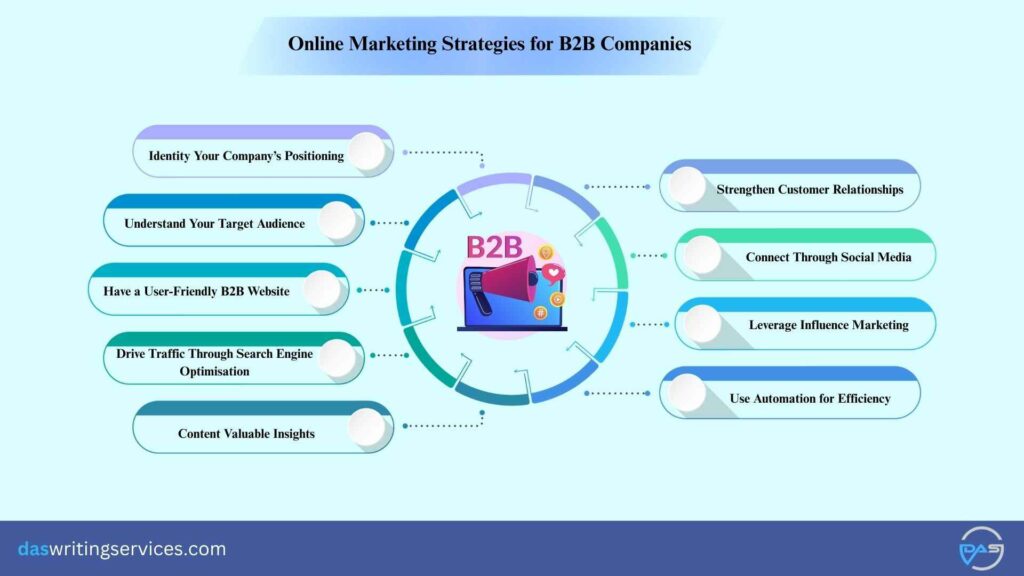
Now that you have understood the meaning of B2B internet marketing and its benefits, you must have a look at the strategies to grow your business and acquire new customers. The following are a few crucial strategies you must follow for your B2B company:
1. Identity Your Company’s Positioning
One of the key steps in executing a B2B marketing strategy is an understanding of your brand positioning. Positioning is a strategy that lets your B2B brand find a unique place in the minds of your customers.
In other words, it is a way of differentiating your business from all others so that people can remember your identity easily. As a result, there will be an improved image and more loyalty among your customers for your business.
Knowing where you stand helps in selling your business and your products. It can also help in the creation of marketing messages that the target audience will appreciate.
2. Understand Your Target Audience
Identify your target customers or enterprises who are looking for your offerings. If you already have a CRM tool, you can collect the client database from it and develop and segment buyer personas.
Through this, you can drive your B2B digital marketing strategies and campaigns. Such personas inform you about the crucial points of your customers and how they search for solutions to their needs.
3. Have a User-Friendly B2B Website
Get a great impression on your customers through a well-structured informative website. You can plan your site content, keeping your buyers’ personas, needs and main points in mind.
On a B2B website, earning the prospects’ trust can be supported with an easily navigable, responsive, and mobile-friendly design. For instance, you can let the audience easily take vital actions on your website, reading your blog section, signing up for your newsletter, or filling out your form.
4. Drive Traffic Through Search Engine Optimisation
According to a report, 33% of B2B companies say that Search Engine Optimisation (SEO) helps them generate organic leads. You can use this effective online marketing strategy for your business to get the upper hand from your competitors.
To do this, you can craft unique content, such as articles or blogs, related to your industry and upload it on your website. With an excellent SEO strategy, such web pages will rank at the top of the relevant search results.
Hence, more prospects can find your website, learn more about your products and services, and turn into business customers.
5. Content Valuable Insights
Another effective B2B marketing strategy you can employ is content marketing. In-depth content like blog posts, articles, case studies, and informational videos you put out build up your brand’s credibility in the eyes of B2B customers and enhance their chances of shortlisting your business.
As content marketing also supports other SEO efforts, you can create content your buyer personas may be looking for. It can help your buyers land on your website, giving you a chance to convert them into customers eventually.
6. Strengthen Customer Relationships
Email marketing serves as an excellent way to reach the B2B customer, acting as the perfect investment opportunity to grow your business. You can nurture leads using email marketing if they have signed up for your newsletter or downloaded your white paper.
In addition, you can use the contacts in your CRM by sending personalised emails to your customers. You can also segment them to a higher level of customer satisfaction and loyalty by sharing useful content with each of your segments.
7. Connect Through Social Media
You can create social media pages for your business on the respective platforms that your B2B customers use. In addition, you can share your website on your social media pages or repurpose the content into short videos or shareable infographics.
Other B2B digital marketing strategies that you may apply to social media include running paid ads targeting lookalikes and your existing customer segments. It will enable your reach and help you turn the potential leads into loyal customers.
8. Leverage Influence Marketing
Influencer marketing is one of the trendiest strategies in B2B online marketing, leading content creators to collaborate for the promotion of your brand on social media platforms or other digital channels.
Therefore, if your business sells automation software for accounting, the collaborations will include influencers who create tech or accounting content. Influencer audiences can range from several million followers down to less than 10,000.
9. Use Automation for Efficiency
Other emerging B2B digital marketing strategies will include the use of automation to enhance efficiency, allow personalisation, and measure campaigns. There are several different tools one can use that will help you incorporate automation into a marketing strategy.
For example, a CRM will help manage your marketing processes by the automatic pulling in of customer data, emailing campaigns, and more. It will help you understand your audience’s requirements and fulfil them according to their needs with the help of automation.
Difference Between B2B Marketing and B2C Marketing
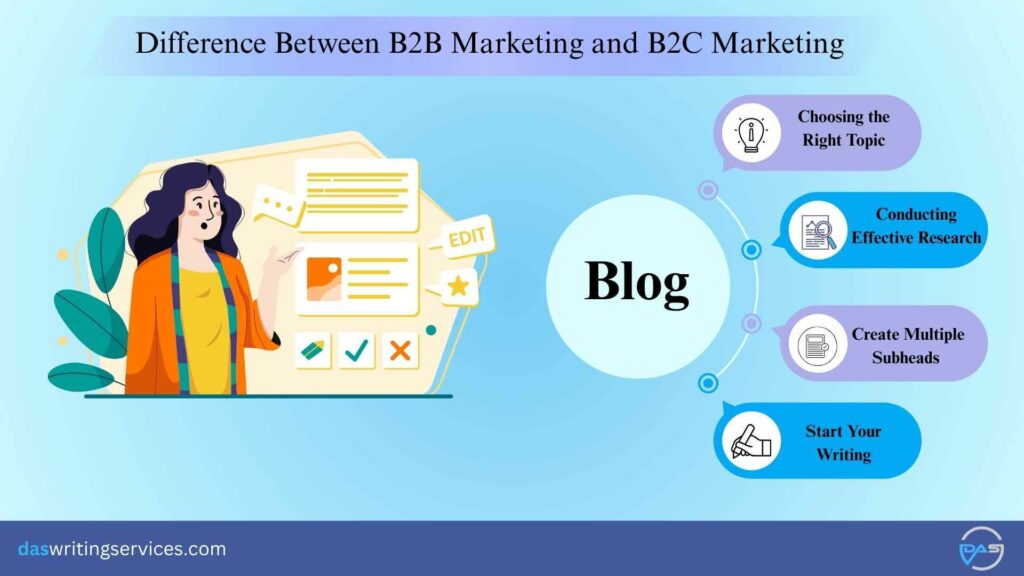
The following table illustrates the difference between B2B marketing and B2C marketing:
| Parameters | B2B Marketing | B2C Marketing |
| Goal | Customers prioritise return on investment (ROI), efficiency, and expertise. | Customers seek deals and entertainment where marketing needs to be engaging. |
| Purchase Motivation | Customers are motivated by rational reasoning and financial rewards. | Emotions drive customers to go opt for this. |
| Purchase Purpose | Buyers opt for long-term solutions, leading to extended sales cycles, contracts, and relationships with businesses. | Customers may not always be seeking extended solutions or enduring relationships. |
Takeaway
Overall, B2B online marketing is one of the essential elements for businesses that need to thrive in today’s digital-first world. The dynamic online platforms offer endless opportunities for optimisation and innovation.
However, the only downside of choosing online marketing strategies is that the established practices get outdated quite quickly. So, consistent innovation backed by data driven decisions is the key to ensure quantifiable results with b2b marketing.
Frequently Asked Questions
With B2B online marketing, you can precisely target your prospective customers who are likely to convert based on their demographics, firmographics, and online activities. You can even identify and target individual users visiting your website. In contrast to traditional marketing, where a larger net is cast without having as much precision, it comes with higher costs.
Content marketing for B2B companies helps them to establish leadership, generate high-quality leads, build brand awareness, educate the target audience and enhance organic visibility. Moreover, it offers a cost-effective marketing alternative and differentiates your brand from competitors.
Regarding search engine optimisation for your B2B website, the primary focus will entail keyword research for industry specifics and the development of high-quality relevant content. In addition, you must have a mobile-friendly website, enhancing the site speed and building high-quality backlinks to your site.
Subhodip Das is the founder and CEO of Das Writing Services Pvt. Ltd. He has an experience of 12 years in the field of Digital Marketing and specialises in Content Writing and Marketing Strategies. He has worked with well-established organisations and startups helping them achieve increased Search Engine Rank visibility. If you want to grow your business online, you can reach out to him here.
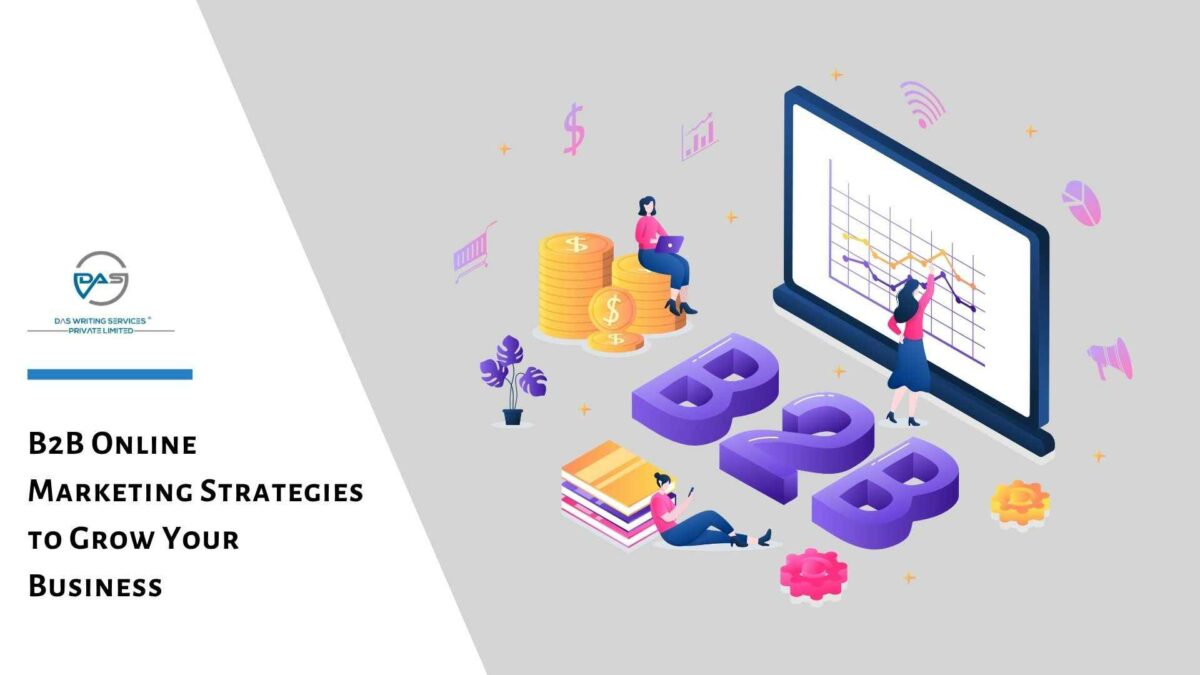
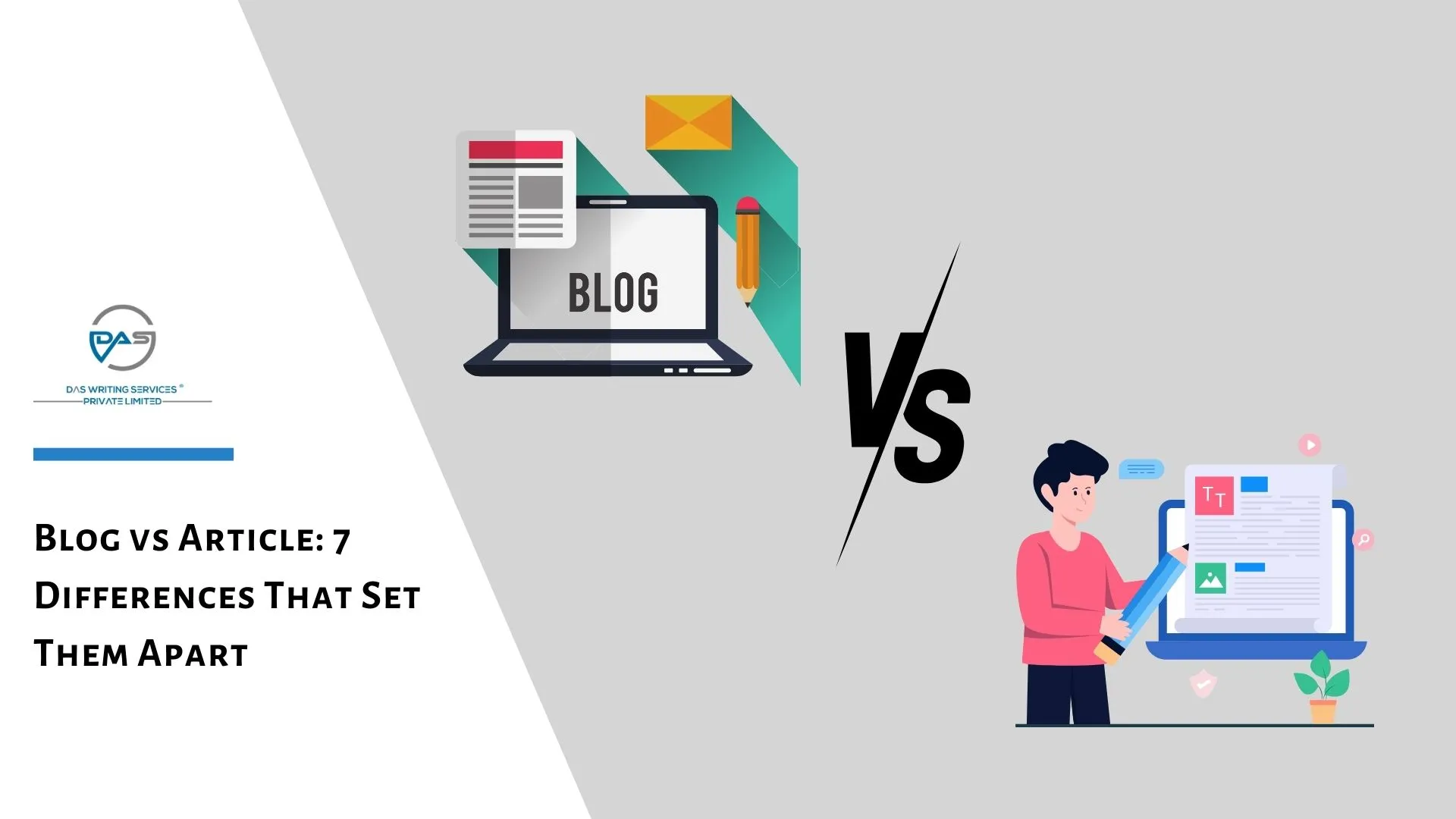
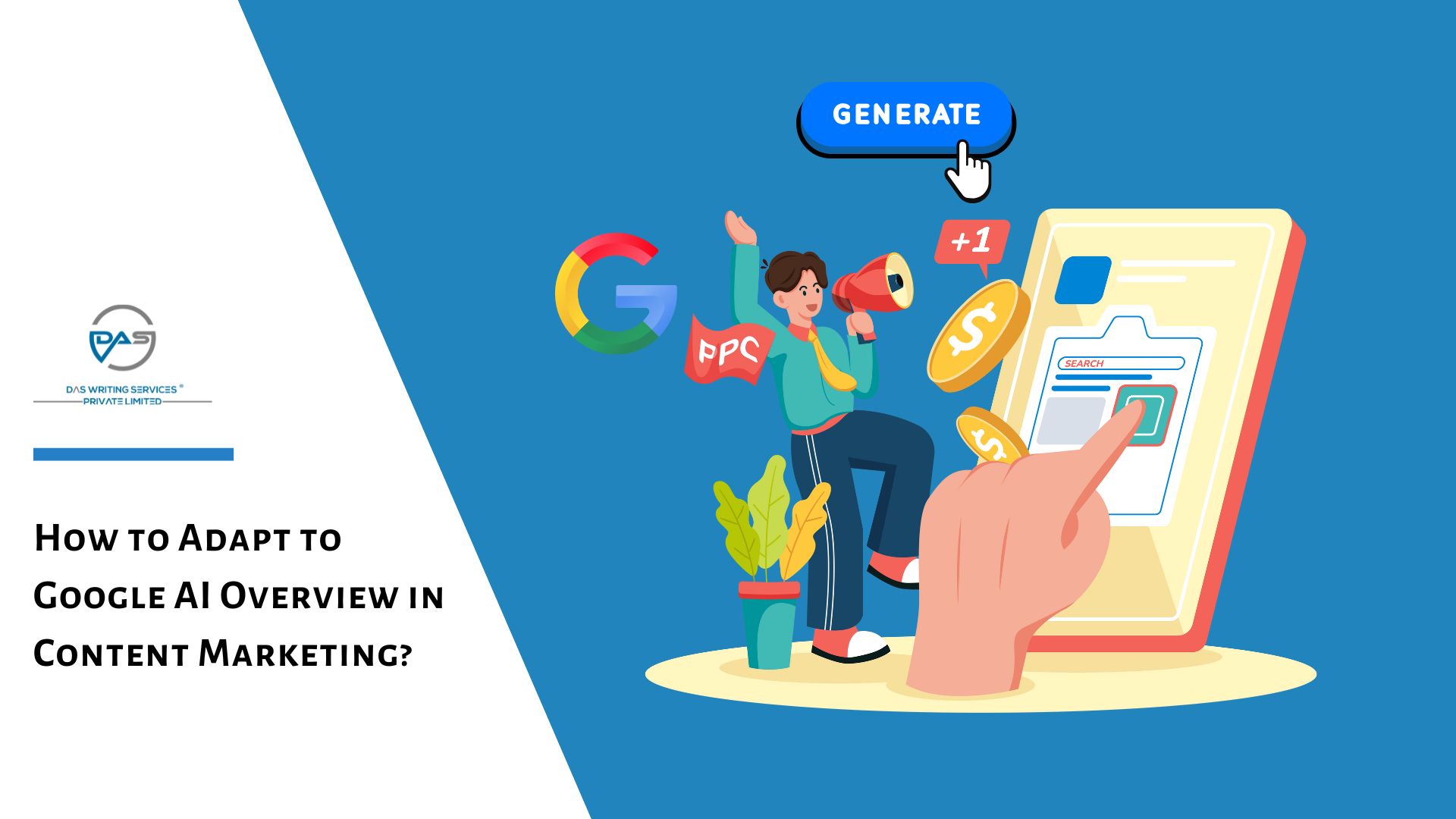
Leave a comment